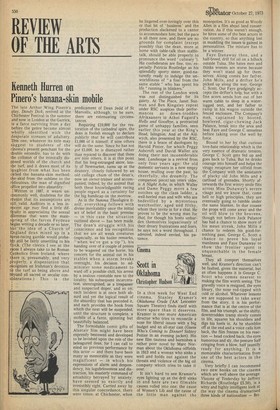Kenneth Hurren on Pinero's banana-skin mobile
The late Arthur Wing Pinero's play, Dandy Dick, revived at the Chichester Festival in the summer arid 'now in London at the Garrick, is. a' farce surviving from a day before the genre became almost wholly identified with the desperate stresses of adultery. This one, whatever its title may s'uggest to students of the cinema's present penchant for the dbuble entendre, has to do with the collision of the inimically disppsed worlds of the church and the turf, and it draws most of its lcughter from what has been called the banana-skin method: the, skid from the sublime to the rkliculous, the man of dignified orfice propelled into absurdity. :Written in 1887, it wears unchrnmonly well, doubtless for the !team that its assumptions are still valid, Auditors in a less innpcent age may find a little diffipulty in appreciating the sexual dllemmas that were the mainspring of the farces Feydeau began writing a decade or so later, but' the idea of a Church of England dean mixed up in a hprse-racing gamble would probably still be fairly unsettling to his ftock. (The clerics I see at the roces I always take to be Roman Gatholics from Ireland, where tilere is, presumably, and very properly, a dispensation that recognises an Irishman's devotion tb the turf as being above and 4yond all sacred or secular considerations.) This is the
predicament of Dean Jedd of St Marvells, although, to be sure, there are extenuating circumstances.
Requiring £10,000 for the restoration of the cathedral spire, the dean is foolish enough to declare publicly that he will contribute £1,000 of it .himself, if nine others will do the same. Since he has not got £1,000, he is dismayed rather than rejoiced to discover that there are nine others. It is at this point that his long-estranged sister, lately of Newmarket, turns up at the' deanery, closely followed by an old college chum of the dean's, now an owner-trainer and accompanied, indeed, by the animal that both these knowledgeable racing people regard as a certainty for the big handicap on the morrow. As in the Summa Theologica itself, everything follows with divine inevitability once the initial act of belief in the basic premise — in this case the situation outlined above — has been made. The dean's struggle with his conscience and his recognition that we are all weak creatures (especially, as his butler remarks, " when we've got a tip "), his handing over of a couple of ponies to be wagered on the horse, his concern for the animal out in his stables when a storm breaks overnight, his decision to administer some medicament to ward off a possible chill, his arrest by a zealous constable new to the locality, his subsequent incarceration, unrecognised, as a trespasser and suspected doper, and so on: each incident is at once both absurd and yet the logical result of the absurdity that has preceded it, and each provides the hook from which the next will be suspended, until the structure is complete, a mobile of a farce, spinning but beautifully balanced.
The formidable comic gifts of Alastair Sim might have been expressly bestowed and developed to be lavished upon the role of the beleagured dean, for I can call to mind no previous performance by this actor — and there have been many as memorable as they were magnificent — in which his expressions of alarm and despondency, his lugubriousness and distraction, his masterly command of amiability betrayed by anxiety, have seemed so exactly and irresistibly right. Carried away by this singular concordance, there were times. at Chichester, when he lingered over-lovingly over this or that bit of ' business ' and the production slackened to a canter to accommodate him; but the pace is all there now, and there are no grounds for complaint (except possibly that the dean, more at home with table-talk than stabletalk, should be able properly to pronounce the word 'culinary '). His confederates are fine, too, especially Patricia Routledge as his splendidly sporty sister, good-naturedly ready to indulge the unworldliness of "a foal from the same stable " who has spent his life " running in blinkers."
The rest of the London week was not distinguished for its gaiety. At The Place, Janet Suzman and Ben Kingsley repeat under RSC auspices their performances as down-trodden Afrikaaners in Athol Fugard's Hello and Goodbye, a protracted game of unhappy families, seen earlier this year at the King's Head, Islington. And at the Aldwych, also presented by the RSC, there is a brace of duologues by Harold Pinter, for which Peggy Ashcroft and David Waller are doing their not inconsiderable best. Landscape is a revival from only four years ago: the old domestic servants in a now empty house, mulling over the past, he cheerfully, she dreamily. The companion piece,t ten years older, is A Slight Ache, in which Waller and Dame Peggy move a few notches up the class ladder, a well-heeled man and wife who are bedevilled by a mysterious matchseller, aged and filthy, whom they invite in for a chat. He proves to be the wrong man for that, for though his hosts unburden themselves loquaciously of their dreary frustrations and fears, he says not a word throughout. I admired, indeed envied, his patience.


































 Previous page
Previous page